Merfield House (Also spelled Merefield and Mirfield). It was built about 1808 for the Noad family. Jonathan Noad, who was born about 1739, inherited Rockabella Mill from his adoptive father and lived in the adjoining house. He married Sally Whitaker in 1762, whose father, Thomas Whitaker, was a clothier and dyer with dyehouses at Rode Bridge and Shawford. Jonathan Noad built “Merefield” on land he bought from John Edwards circa 1806/8 and he left it to his third son Jonathan in his will of 1809. The census for 1841 shows the head of household at Merfield was Helen Noad (previously Helen Boyd), 60 years old, with Mary Noad, age 25, Helen Noad, age 25 and Grace Noad, age 20. By 1846 Thomas Pooll had bought the house and in 1851 he and his sister, Alice, were living here. When Thomas’ brother, Henry B. Pooll, died in 1861, he left Merfield House to his sister, Martha. In a Bill of Complaint filed 9th of April, 1862 the property was described in this way:
“The land around and occupied with Merfield House consisted of about 27 acres in the whole exclusively of the garden and offices which contain about one acre and sixteen perches additional.”
In 1866, Mrs. Ann Bailey, sister of Martha, had moved from Mayfield House and was living here with Martha. In 1879 when Mrs. Bailey died she was 97 years old and she was the last member of the Pooll family. She had been married to James Bailey and she was a sister of Henry B. Pooll. Her funeral procession consisted of a hearse and four mourning coaches, each drawn by four horses. Most of the tradesmen of the village left Merfield House on foot at twelve o’clock and the procession eventually made its way to the parish church where the funeral ceremony was performed by the Rev. Oke and his curate. Along the whole route, the shops were closed and most of the windows were blinded. In 1882 Mrs. Bourne lived at Merfield and she was still here in 1888 when she was robbed of a quantity of silverware and other possessions. According to Mr. H. Hopkins, the thieves were caught and received severe sentences of up to 10 years. In 1891 Major Budd lived at Merfield House and he was closely involved with the Reading and News Rooms, often supplying books and periodicals. Between 1902 and 1919, it was occupied by the Hon. Charles French, in 1923-1931 by Mrs. Blakeney, in 1935 by Bernard Caillard and in 1939 by Capt. William Dale Chater.
Today the interior of Merfield House retains many of its original features including much decorative plasterwork. The house is located in a lovely park with many mature trees and a fine view.
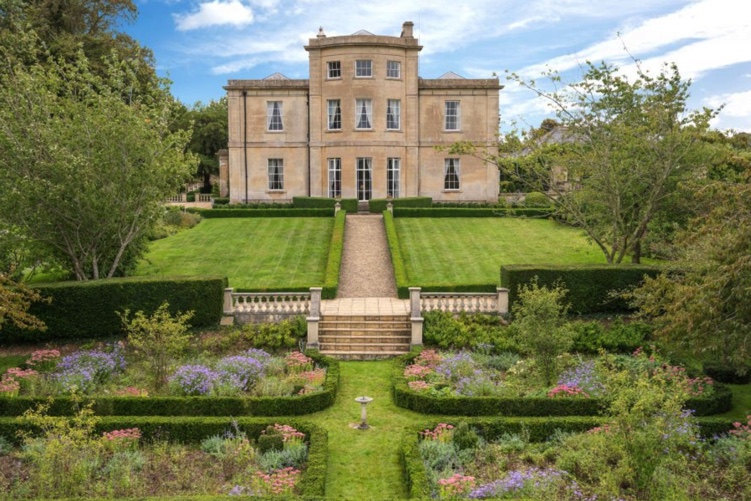
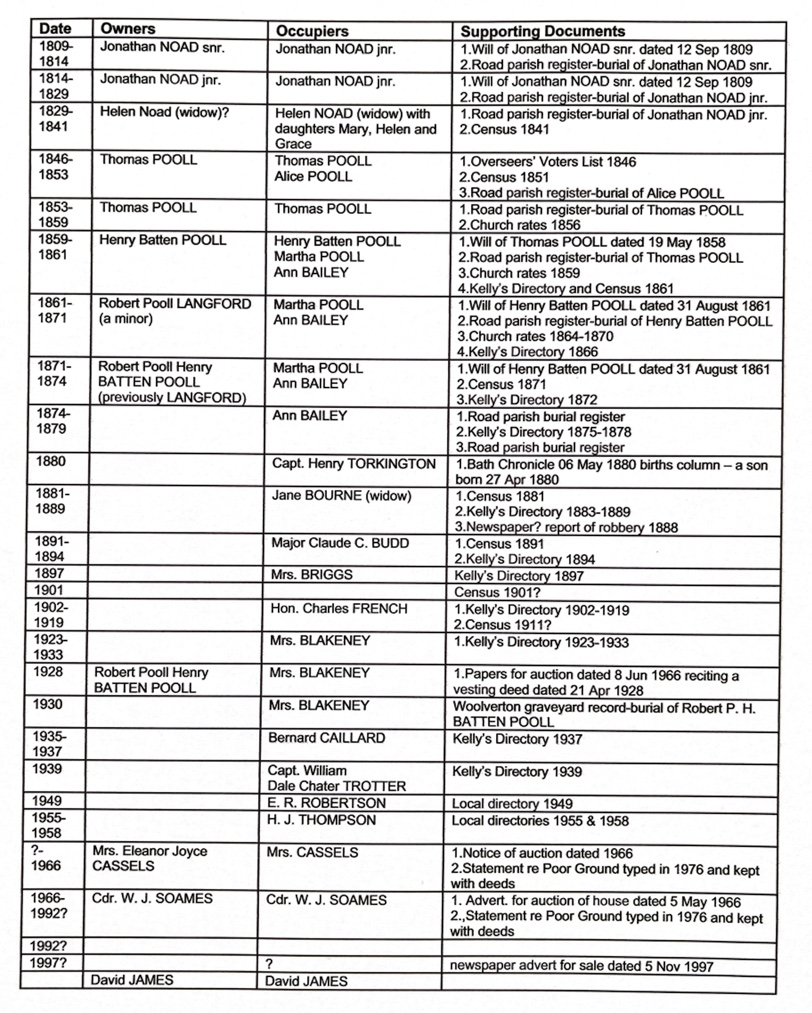
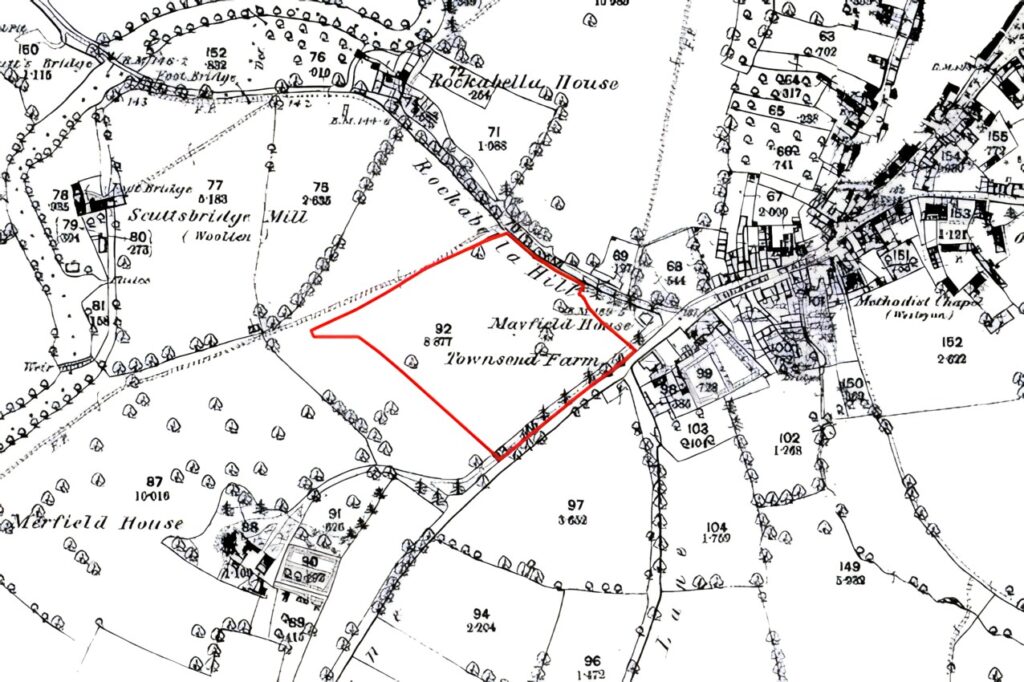
Merfield House it is amongst the 5.8% of all Listed Buildings in England accorded Grade II* status, which are deemed to be particularly important buildings of more than special interest. It is a fine and well-preserved example of an early 18th-century Georgian country house. It has considerable architectural interest, including notable Greek Revival style details mentioned in the Rode Conservation Area Appraisal (Mendip District Council 2009). The numerous original internal architectural features enhance the architectural interest of the asset.
The SHER records that Jonathan Node, a clothier, rented Rockabella Factory (24249) from Samuel Norman as early as 1795, and then (presumably having purchased it) passed the factory to his son Jonathan Node in 1809. The fortunes of the family, and the construction of Merfield House, were therefore closely linked to the development of the local wool and textile trade. The fact that the construction of Merfield House likely relates to the early 19th century expansion and flourishing of the textile trade as a direct result of the industrialisation of the process, enhances the historical interest of the property. As Rockabella Factory became a private house and then became ruinous by the second half of the 19th century (having passed out of the Node family’s ownership), there is no surviving appreciable link between Merfield House and Rockabella. [Extract from Wessex Archaeology report on the planning application at The Mead, November 2020]
The Poor Ground
Land adjacent to Merfield House (see the parcel of land numbered 69 on the map below) was known as the Poor Ground.
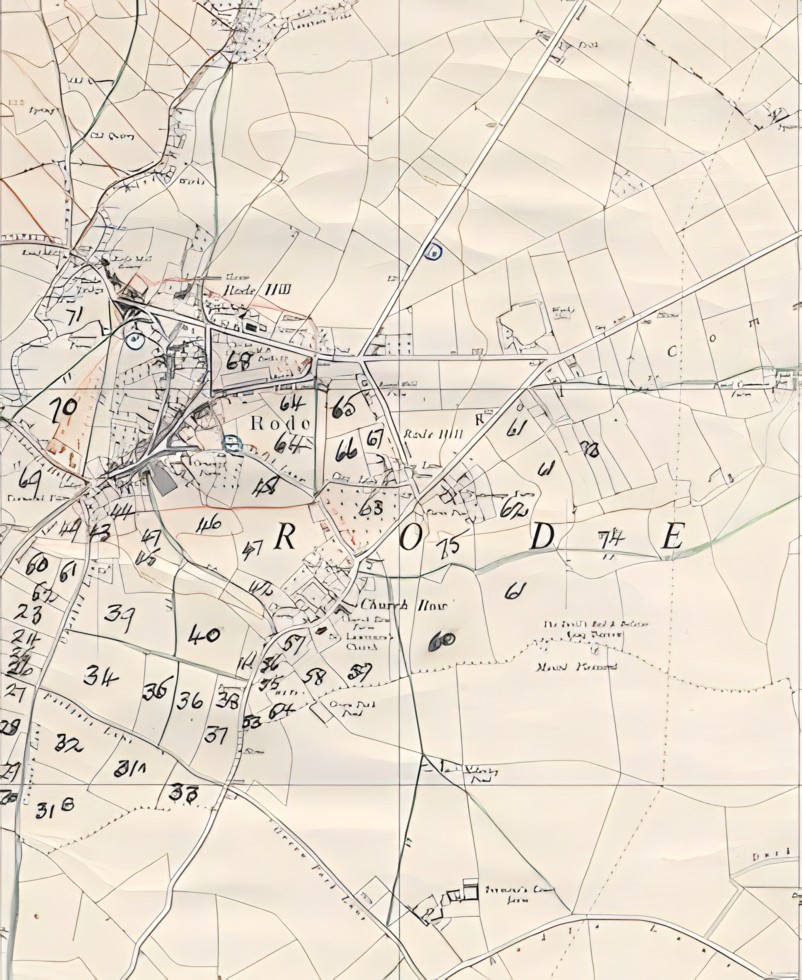
The following document was found in Parish Council records presumably copied from an unknown record of parish charities in Somerset. The record must have been made before 1839, when the land was sold to Mr. Thomas Pooll in order to provide money to assist the poor of the parish to emigrate:
ROAD
Mention has already been made in the account of Beckington parish, in this county, of an annual sum of £6, secured upon land at Westbury, by the deed of Thomas Webb, dated 6th February, 20th Queen Elizabeth, ( see the abstract of this deed in the report of the Beckington Charity,) £5 of which was thereby appropriated to the use of the said parish of Beckington, as is stated in that deed, and 20s. were to be paid to the churchwardens of Road, to be distributed in bread to the poor.
In addition to which, William Yerbury gave to the churchwardens of the parish of Road, the sum of £50, with a direction to procure a rent-charge of 50s. a-year, to be settled for the payment of 10s on every Friday for five weeks in Lent, to be distributed to the poor of the said parish for bread, for ever. By an indenture, dated 5th March 1703, (produced to the Commissioners,) made between William Crabbe and others, parishioners of Road, of the first part, Tobias Crabbe and another, churchwardens of the said parish, and John Howell and another, overseers of the said parish, of the second part, and Honor Harris and another of the third part, reciting (among other things) that the said churchwardens had already in their hands, monies belonging to the said parish to the amount of £55 which, with the addition of £50, a legacy given by the said William Yerbury, made up the sum of £105. with which they had contracted for the purchase of the premises after mentioned; It is witnessed, that as well for the complete fulfilling of the decise of the said sum of £50, as also for settling the remainder of the profits, of the said premises so purchased as aforesaid, they the said William Crabbe and others, did declare, that the therein recited grant and release of the said meadow or pasture ground called Leys, containing 3½ acres, more or less, in Road aforesaid and Woolverton, and abutting upon the highway leading from Road to Scutch Bridge, on the north side, and upon a ground called Green Meere, in the south field of Road aforesaid, on the south side, was made to them, upon trust that the annual sum of 50s. should for ever thereafter be paid out of the rents of the said premises to the churchwardens and overseers of the said parish of Road to the intent that they should yearly dispose of the said 50s. according to the direction of the said William Yerbury in his will, and that the residue of the said rents and profits should be paid to the churchwardens and overseers of Road, and their successors, in trust for the poor inhabitants of the said parish, These two sums of 20s. and 50s. are distributed in bread to the amount of 10s. weekly on the seven Fridays of Lent. A sixpenny loaf is given to each of twenty families.
Fields258a and 258b on the tithe app. map of 1839 are described as ‘Poor Ground’ (see plan below – the red lines mark the extent of a proposed housing development, permission for which was turned down in 2021).
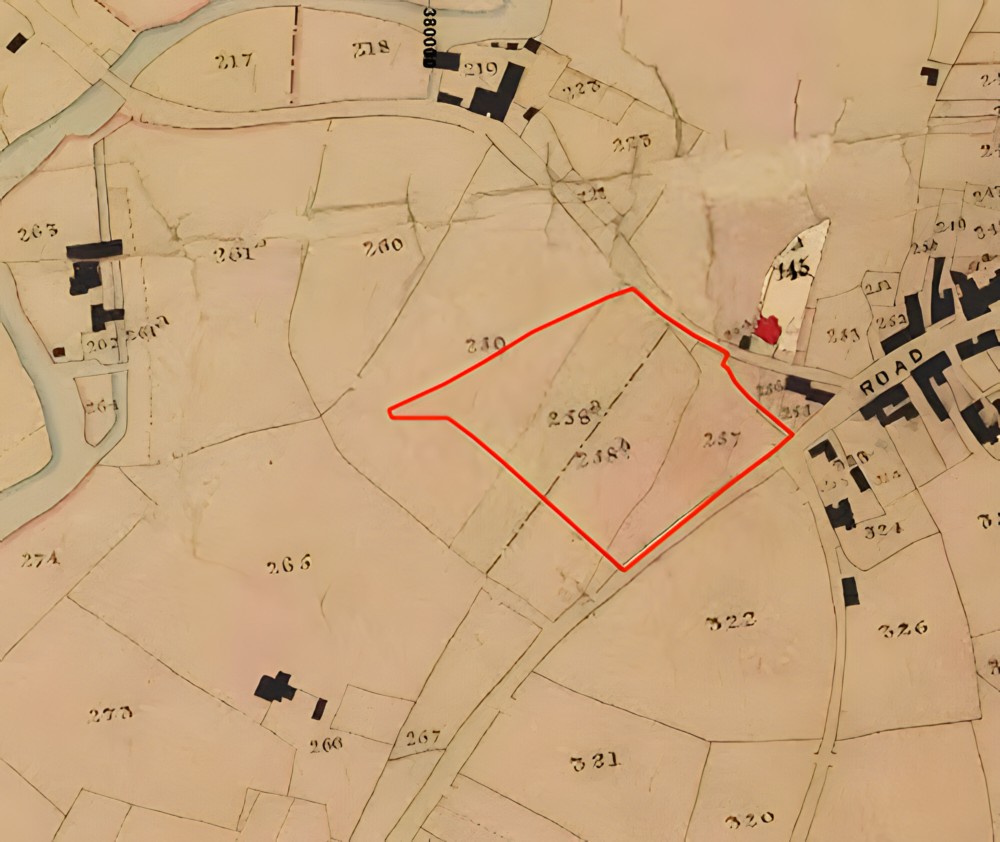
According to the statement of the churchwarden of the parish, it is in the recollection of several of the parishioners that a rent-charge of 8s. per annum, issuing out of certain house in Road, formerly in the possession of Mr. Quance was payable to the parish. It is not known how this rent-charge arose. It has not been paid for many years; a person of the name of Quance used formerly to bring the amount in bread to the church, and distribute it to the poor at his discretion. This person appears to have sold part of the property to a dissenting congregation for their chapel, and he engaged to enumerate them for this rent-charge, leaving the residue of the property charged to descend to his daughter, who paid the money for some years till she became a pauper, and received parish relief herself, from which time the payment was discontinued. A Mr. John Wheeler, a millwright, of Road, bought this property of the daughter, then a widow of the name of Moore, and has always refused to pay this charge, on a pretence that the parish has lost its right by not insisting on the payment.
The Poor Ground
Extract (spelling mistakes included) from the minutes of the Annual Parish Meeting [Assembly] held on 28th of March 1895:
One item he [the chairman, Mr R P H Batten Pooll] specially wished to bring before the notice of those present, and through them to the villiage in general, namely, the Parish Charities. Misrepresentations as to their origin and amount had at various times been circulated, and he therefore, took the opportunity of thanking Mr. Penrose for obtaining a copy of the charities from the Commissioners, which, with the title deeds now lying on the table, would prove that the poor of Road had been honourably dealt with, and were, and had been, duly receiving their full benefits. He begged to read the following extract from the deeds, the originals of which any person present could read for themselves.
About 1700, one William Yerbury, by his Will, left £50 to procure a rent charge of 50s/- a year, and directed this sum to be paid by sums of 10s/-, every Friday for five weeks in Lent, to be distributed in bread among the poor of the parish of Road for ever. In 1702 the Churchwardens and Overseers of the parish, having in their hands Yerburys bequest, and other parish moneys amounting to £55, with this sum of £105, purchased the peice of land called the Poor Ground.
By deed of Declaration of Trust, dated 19th March 1702, (which deed is in the possession of Mr Batten Pooll) the said piece of land was formally vested in the Churchwardens and Overseers of the parish for the time being upon the following trusts, namely, to pay out of the rents and profits 50s/-, every year in Lent bread (as above mentioned) and to apply the residue for the benifit of the poor inhabitants of the parish. These trusts were, it is presumed, acted upon untill the year 1838, at which time the parish had become much impoverished, probably owing to the decay of the cloth trade, and amongst other things money was required to assist some of the inhabitants to emigrate. The vestry books of the time contain various entries to this effect. This being apparently the state of affairs throughout the country, an Act of Parliament was passed in 1835, (5 and 6 William IV., c69) for the express purpose of enabling parish authorities, subject to the approval of the Poor Law Commissioners and the local Boards of Guardians, to sell and convey parish land and property, and apply the proceeds for the relief of the poor (section 3).
In 1839, the late Mr. Thomas Pooll, of Road (Uncle and predecessor in title of Mr Batten Pooll) agreed to purchase the poor ground of the parish authorities, under the above Act, for £349 [(] an amount much in excess of the real value of the land), subject to the annual payment of 50/- for the Lent bread, which, having been devised in perpetuity, could not be relinquished. The deed of conveyance from the Guardians, Churchwardens, and Overseers of the parish to the said Thomas Pooll is in the possession of Mr. Batten Pooll, and is dated the 12th February, 1839. It is duly executed by the parish officials, sealed by the Frome Guardians, and approved and counter-sealed by the Poor Law Commissioners in London. The Vestry books of the time contain entries showing how the purchase money was dealt with.
From this date the rents and profits were received by Mr Thomas Pooll (deceased), and since by Mr. Batten-Pooll, his devisee, and 50s/- charge has been punctually paid. The Chairman further announced he had had a copy of the original deeds prepared at his own expense, and would now hand them over to the Parish Council for safe custody with thier other papers.
In addition to the above 50/- per year, there was £1 annualy received through the Beckington Charity Trustees [from the Webb charity], making a total of 70/-. This year [1895] 280 4lb loaves had been secured from the bakers of Road for that sum, and distributed.